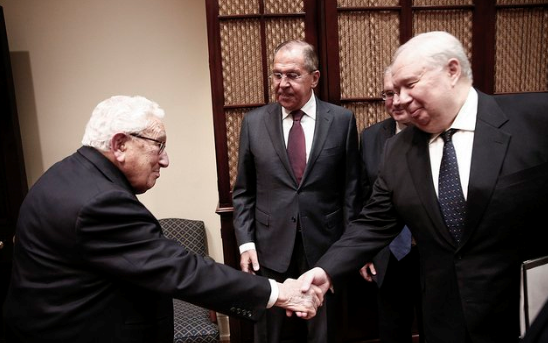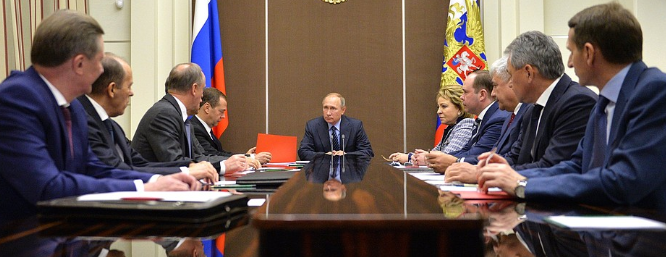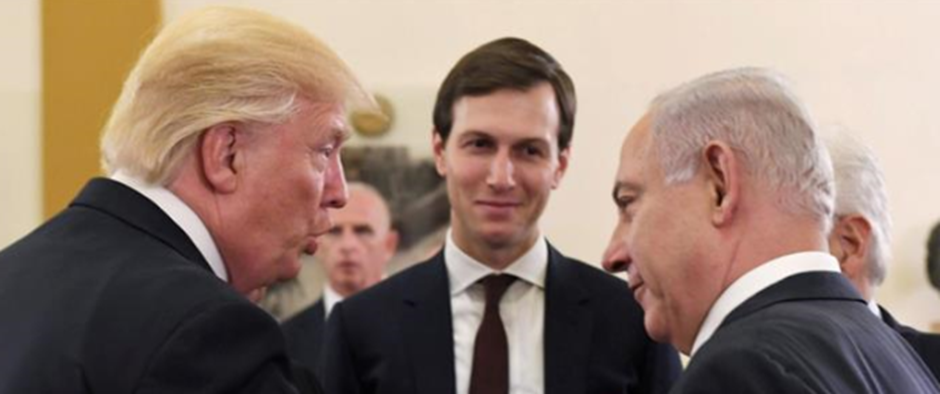By John Helmer, Moscow
Jared Kushner’s title is Director of the Office of American Innovation at the White House, a new function for the old one of overseeing everything in the US Government for the benefit of the incumbent president. He’s also ranked Senior Advisor to the President, and by marriage he is son-in-law to President Donald Trump.
Stupidity isn’t a crime; it’s a life sentence. Not so for power. Supposing everything Kushner has written in his presentation to the US Senate Intelligence Committee on Monday is true, then one conclusion from a half-dozen bits of evidence he testifies to is obvious – Kushner is unfit to rule, and so are the Russians whom he mentions.
Here are the eleven pages of Kushner’s public statement to the Senate Select Committee on Intelligence. His committee appearance and additional testimony were behind closed doors, lasting about two hours. Kushner gave his testimony on Monday (July 24). Reading the statement isn’t difficult because the vocabulary is simple, the logic of presentation rudimentary, the style impersonal.
Two slips are revealing, but they have so far gone undetected in the voluminous US media coverage. The first reveals just how ignorant Kushner, his legal and other advisors are of Russia, although it is the target of the proceeding. At page 8, he claims “Nvgorod [is] the village where my grandparents were from in Belarus.” This looks like a typo for Novgorod (literally, “new town”), the ancient Russian city west of Moscow. It is more than 200 kilometres from the current Russian frontier with Belarus and the historical border with the territory which for a thousand years has been occupied by Lithuanian, Polish, German and Russian imperial as well as Soviet forces. Kushner’s grandparents actually came from Navahrudak (Навагрудак), spelled in Russian as Новогрудок (Novogrudok). The meaning of the word, which was first used for the place in the 11th century, is “new little town”. When the Germans arrived in July 1941, there were 20,000 residents, 10,000 of whom, including the Kushners, were Jewish. The Kushners escaped; the majority who didn’t were killed. Kushner reveals he doesn’t know. His, and everyone else’s mistake, is 834 kilometres off the mark.
Also, by the M1 highway direct between Minsk, the current capital of independent Belarus, and Moscow, the distance is 856 kms. If Kushner’s father-in-law launched a nuclear attack on Russia, followed up by NATO missiles and forces from Poland, the Baltic Sea and the shore territories, it’s likely Novogrudok would be bypassed; and depending on which way the wind was blowing, the radioactive fall-out, too. Kushner reveals he doesn’t comprehend these things.
Kushner’s second slip is evidence on the issue, as he states it, of collusion with Russia during the election campaign and during the presidential transition, before Trump was inaugurated on January 20. Kushner claims at the end of his testimony: “I did not collude, nor know of anyone else in the campaign who colluded, with any foreign government. I had no improper contacts.”
But Kushner admits that during the campaign he “had incoming [sic] contacts with people from approximately 15 countries.” He also had “hundreds” of “calls, letters and emails from people…outside the United States.” He says he asked Henry Kissinger for “advice on policy for the candidate, which countries/representatives with which the campaign should engage, and what messaging would resonate.” He says he spoke once for “less than a minute” with Russian Ambassador Sergei Kislyak at an April 2016 Trump campaign speech in Washington, when the Russian was accompanied by three other foreign ambassadors; Kushner doesn’t name them.
He denies any record of receiving or remembering two reported telephone calls with Kislyak between April and November, and had forgotten his name when, on November 9, an official congratulatory note arrived for Trump from President Vladimir Putin. From November 9 to January 20, Kushner says he received “over one hundred contacts from more than twenty countries…They included meetings with individuals such as Jordan’s King Abdullah II, Israel’s Prime Minister Bibi Netanyahu, Mexico’s Secretary of Foreign Affairs, Luis Videgaray Caso and many more.”
A neophyte in foreign affairs as Kushner confesses himself to be, he doesn’t reveal that Videgaray and he set up candidate Trump’s visit to Mexico City to meet the Mexican President on August 31. The Mexican reaction to that was extremely hostile. Videgaray was forced to resign as finance minister on September 7, but promoted to foreign minister on January 4. Videgaray might be charged with colluding with the Americans to advance himself, with Kushner as co-conspirator, but no senator on the Intelligence Committee is reported to have asked Kushner about that.
Kushner may not know the nicknames of Videgaray or King Abdullah, but he certainly refers to the Israeli prime minister as Bibi, an appellation well-known to Israelis and Jews worldwide. His official name is Benjamin, and there is ample evidence that Kushner has been familiar with Netanyahu for many years. Kushner’s father is also widely reported in Israel as Netanyahu’s personal friend. Kushner’s slip in yesterday’s evidence was to reveal just how familiar he is with that foreign official, who met with Trump and Kushner for a campaign appearance in Israel in June, five months before Election Day.
The special relationship between Israel and the US cannot be collusion – that’s a rule of US politics. The rule wasn’t quite so fixed in the 1980s when the FBI caught US officials at spying, stealing and smuggling on behalf of Israel, and sent one of them to prison; click for details.
Nor can God and the Orthodox Jewish group known as Chabad-Lubavitch be reported as colluding in Trump’s victory, despite the evidence that Kushner and his wife Ivanka prayed for it at a Lubavitcher shrine on the weekend before the poll.

Source: http://www.haaretz.com/world-news/u-s-election-2016/1.751279
The Israeli and Jewish community media also claim the possibility that Kushner’s pilgrimage reminded God to intervene when there was a suspected assassination attempt against Trump in Arizona at the same time.
The inadvertence of these slips in Kushner’s statement reinforces his claim that he knows the difference between collusion with Russians and special relationships with Mexican, Israeli and Lubavitcher friends. The US press and the US Senate appear convinced of the same thing.
The evidence presented on Kushner’s meetings with Russians between April 2016 and January 20, 2017, adds up to four occasions for durations he reports of “less than” 1 minute + 10 minutes (“or so”) + 20-30 minutes + 20 – 25 minutes. That makes a total of 66 minutes at most, with several accompanying witnesses.
“Ten or so” of the minutes involved the recently reported meeting in New York on June 9, 2016, at which Kushner’s brother-in-law Donald Trump Jr. was hosting a Russian lawyer, Natalia Veselnitskaya, and her associates. Supposing that Kushner is telling the truth about the meeting on two points — that its subject was “the issue of a ban on US adoptions of Russian children”, and that he was uninterested and left prematurely – this time ought to be subtracted from the serious time Kushner admits he did spend on matters of state policy towards Russia. That leaves 56 minutes.
There are revelations in Kushner’s testimony about what transpired in this time. The first is that Dmitri Simes was involved with Kushner in arranging Trump’s campaign speech in April 2016, and that Simes fixed Kushner’s 1-minute introduction to Ambassador Kislyak. Simes runs the think-tank called Center for the National Interest, which was the creation of former President Richard Nixon. A Center press release reveals the other ambassadors Kushner shook hands with but doesn’t name were from Italy, Singapore and the Philippines. The names of others attending can be found here, without mention of Kushner, plus Trump’s speech.
About Russia on that occasion, Trump said: “Russia, for instance, has also seen the horror of Islamic terrorism. I believe an easing of tensions, and improved relations with Russia from a position of strength only is possible, absolutely possible. Common sense says this cycle, this horrible cycle of hostility must end and ideally will end soon. Good for both countries. Some say the Russians won’t be reasonable. I intend to find out. If we can’t make a deal under my administration, a deal that’s great — not good, great — for America, but also good for Russia, then we will quickly walk from the table. It’s as simple as that. We’re going to find out. “
Simes (Дмитрий Саймс), son of Jewish dissidents expelled from the Soviet Union to the US in 1978, is the Uriah Heep of Russian-American advisors, ingratiating themselves to both sides and making a living out of obsequious intermediation. He was Richard Nixon’s factotum when the disgraced president visited Moscow. Nixon died in 1994 leaving Simes his think-tank as an inheritance. Its motto is “America’s Voice for Strategic Realism”. Kissinger is the honorary chairman, succeeding the American International Group (AIG) fraudster Hank Greenberg.

From left to right: Simes, Greenberg and Kissinger. This month Greenberg was given the Center’s “Lifetime Achievement Award” in Kissinger’s presence, along with a general, an admiral, and four senators. Source: https://cftni.org/recent-events/cftni-presents-lifetime-achievement-award-to-maurice-r-hank-greenberg/
When there is escalating conflict between the US and Russian governments, Simes is of next to no value to either side. His advice has also been worthless when there is booming business between the Russian oligarchs and their US counterparts. The long dominance of Russia policy by the Clinton and Obama Administrations has been bad for Simes’s business; war between the White House and the Kremlin allows him no room for manoeuvre at all. So cultivating Kushner and Trump in the spring of 2016 was a business opportunity Simes exploited. Trading that to the Washington embassies of Italy, Singapore, the Philippines and Russia was Simes’s bread and butter. Kislyak and the other envoys got their minute with the candidate. They are likely to have paid for it.
Kushner now reveals how Kislyak tried cashing in. Kissinger and Simes continued being helfpul to the Trump campaign once they were sure he would win the Republican Party nomination. When Kushner’s memory of Kislyak’s name failed, he didn’t google for it — he says he sent Simes an email. Evidently, the name wasn’t urgently needed. Simes has continued to be as ingratiating to Kushner as he was at first to Nixon, and since then with every other candidate with the main chance.
What Kushner reveals with Simes, again inadvertently, is how inconsequential the Russian ambassador’s links were in Washington in 2016, despite starting his term eight years before, in 2008. If Simes was the go-between with Kislyak – if Kislyak couldn’t have gone straight to Kissinger, for example – then this is evidence of haphazard collision, not of calculated collusion.

Kislyak (right) meets Kissinger at the Russian Foreign Ministry in Moscow, with Foreign Minister Sergei Lavrov, in May 2017. Kissinger was directly courted by the Kremlin immediately before the US poll with election to the Russian Academy of Sciences, voted on October 28; for details, read this.
Kushner reveals more. According to his Senate testimony yesterday, Kislyak told Kushner “he especially wanted to address U.S. policy in Syria, and that he wanted to convey information from what he called his ‘generals’.” Supposing Kushner to have heard right, it is a remark which may be as novel for the Russian General Staff as it is new for the US Senate to hear. Was a diplomat really proposing to talk about operations on a war front with the enemy? And was Kislyak asking Kushner and General Michael Flynn, then the US National Security Advisor in waiting, for “a secure line in the transition office to conduct a conversation”?
Never mind that Kushner and Flynn said no, and “so we all agreed that we would receive this information after the Inauguration.” Accepting that Kushner didn’t ask for a back-channel, as he claims, the disclosure that Kislyak asked for one in this fashion — if Kushner is telling the truth — is a blunder of Kislyak-sized proportions. It begs the question: what were the ambassador’s instructions from the Foreign Ministry in Moscow, and what clearance had been given by the Security Council for such a meeting, with such a script, to take place?

Putin chaired Security Council meetings on November 8 – before the election result in the US was k nown – and on November 17 (pictured above) and November 28. Between November 17 and 28 Putin was travelling. Kislyak met Kushner on December 1, and asked for a follow-up session on December 6. That didn’t occur until December 12. In Moscow the Security Council met with Putin in the chair on December 1, 7, 13, and 24.
Kushner has one more disclosure to make of significance. He says that Kislyak kept pestering for another meeting but that he declined because he was too busy. Kislyak then proposed, and Kushner agreed, on a meeting between Kushner’s assistant and Kislyak. That happened on December 12.
Next, according to Kushner, “my assistant reported that the Ambassador had requested that I meet with a person named Sergey Gorkov who he said was a banker and someone with a direct line to the Russian President who could give insight into how Putin was viewing the new administration and best ways to work together. I agreed to meet Mr. Gorkov because the Ambassador has been so insistent, said he had a direct relationship with the President, and because Mr. Gorkov was only in New York for a couple days. I made room on my schedule for the meeting that occurred the next day, on December 13.”
Gorkov, head of the state bank Vnesheconombank (VEB), had met Putin in August of 2016 (pictured below, left), when they discussed development banking policy. They were to meet again, officially, on February 10 of this year (below, right).
Kushner now says he met Gorkov for “twenty to twenty-five minutes”. That’s shorter shrift than Kushner gave Kislyak.
“He told me a little about his bank,” Kushner testifies, “and made some statements about the Russian economy. He said that he was friendly with President Putin, expressed disappointment with U.S.-Russia relations under President Obama and hopes for a better relationship in the future. As I did at the meeting with Ambassador Kislyak, I expressed the same sentiments I had with other foreign officials I met. There were no specific policies discussed. We had no discussion about the sanctions imposed by the Obama Administration. At no time was there any discussion about my companies, business transactions, real estate projects, loans, banking arrangements or any private business of any kind.”
Kushner omits to say whether he employed an interpreter, notetaker or taperecorder at the meeting, and if Gorkov did the same. If Kushner didn’t, he cannot have been following Kissinger’s advice. That Gorkov’s VEB is not a commercial bank, and not intended to conduct the kind of business Kushner has operated for his family raises the questions of what Gorkov was intending to achieve with the call-in, why Kislyak requested it, and who in Moscow decided to push it.
Again, supposing the meeting with Gorkov was as anodyne as Kushner testifies, there is one little thing which stands out on the Russian side. Make that two little things. Kushner describes how Gorkov opened their meeting: “He introduced himself and gave me two gifts — one was a piece of art from Nvgorod, the village where my grandparents were from in Belarus, and the other was a bag of dirt from that same village.” Kushner has told the Senate the fact that he immediately registered the gifts with the presidential transition office proves that he wasn’t trying to conceal the meeting.
But what was Gorkov doing making a gift of anything? If Putin’s power vertical was running normally, this should have required a chain of memoranda, approvals, and instructions running from Putin through the Security Council, the Foreign Ministry and Kislyak. Whose idea was it to make a gift at such a place and time, and what gift options were discussed at the Kremlin?
Whatever the Russian calculation was on December 13, it appears now, in Kushner’s inadvertent retrospect, to have failed disastrously. He can’t remember the name or how to spell his grandparents’ natal village. It is a traditional Jewish custom to bury the faithful with a phial of earth from the Holy Land. But Kushner, apparently not as faithful as he might be, says Gorkov gave him “a bag of dirt”. That phrase says everything.
















Leave a Reply